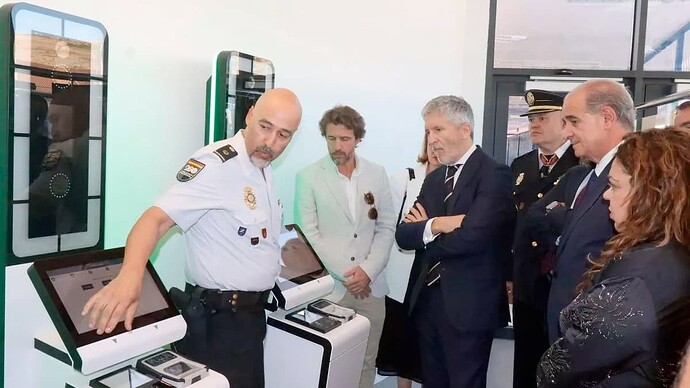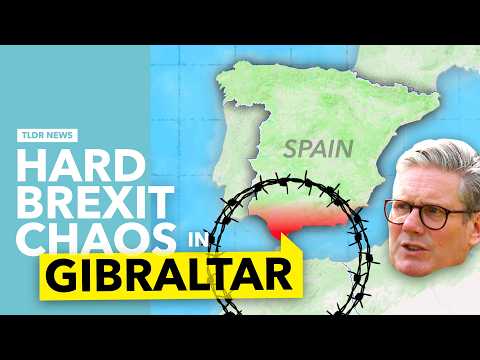The Gibraltar Government on Tuesday issued a technical notice on forthcoming changes to border checks once the EU’s new automated border control system comes into operation later this year.
The Entry/Exit System [EES], together with the European Travel Information System [ETIAS], would mean much tighter controls on non-EU nationals – including people from Gibraltar – when entering the Schengen zone.
It would operate at all Schengen external borders, including at Gibraltar’s land frontier with Spain.
The forthcoming changes are not unexpected and the warnings are not new either, but with a UK/EU treaty yet to be finalised and the implementation date for the new systems edging closer, the Gibraltar Government’s technical notice offered a stark reminder of the reality of Brexit should a deal not be agreed.
All sides in the treaty negotiation have repeatedly stated their desire to reach agreement “as soon as possible”, but the final stages have proved challenging and a deal has so far remained elusive.
Under the EES, non-EU nationals entering the bloc from a non-EU country – including Gibraltar – would first need to register fingerprints and a facial scan with their passport details.
Spain has already started installing automated self-service kiosks at the border to facilitate registration of these biometric details.
Once travellers have provided their biometric and passport information, that registration will be valid for three years.
Those details would then be used to conduct immigration checks every time travellers enter the Schengen area, irrespective of the length of their stay. This will replace passport-stamping.
In the technical notice, the Government repeated its often-stated position that it will reciprocate with similar biometric checks on the Gibraltar side of the border if a treaty is not reached.
“As the Government of Gibraltar prepares for all eventualities, including a non-negotiated outcome, the public should note that Gibraltar would, in the event of a deal with the EU not being reached, enhance its own border control infrastructure providing for the use of e-gates and automated systems which would also process biometric data as is becoming customary at borders across the globe,” it said.
No.6 Convent Place said the EES and ETIAS systems are scheduled to come into force in November 2024, adding that this date “is likely to be before an EU treaty is agreed and implemented”.
The entry into force of both systems has been repeatedly delayed, however, and the EU this week declined to confirm an exact date although it told the Chronicle ETIAS would not come into operation until next year.
“The roadmap for the delivery of the new IT architecture foresees that the Entry/Exit System will be ready to enter into operation in Autumn 2024 and that ETIAS will be ready to enter into operation in Spring 2025,” European Commission Spokesperson Christian Wigand told the Chronicle.
“The exact date will be determined by the European Commission and announced on the EES official website well in time for the start of operations.”
“At the moment we do not have a date to communicate.”
NEW SYSTEMS
The EES collects all personal data listed in a person’s travel document, as well as a facial image and fingerprints, and the date and place of entry or exit from and EU country.
Immigration authorities in European countries will use the EES to verify a person’s identity and understand whether they should be allowed to enter or stay in the EU. The data is also accessible by European law enforcement agencies.
The EES will replace the current system of manual stamping of passports, which the EU says is time consuming and does not provide reliable data on border crossings or systematic detection of “over-stayers”, meaning travellers who have exceeded the maximum duration of their authorised stay.
Under Schengen rules, non-EU citizens including British nationals after Brexit can only stay in the EU 90 days in any 180-day period before requiring a visa.
A non-EU national who overstays their 90 days can be removed from the territory, fined or detained, and even prevented from re-entering the EU in future.
The introduction of the EES will be a first step toward the EU’s new ETIAS framework, under which visa-exempt non-EU nationals will require authorisation prior to travelling to the Schengen zone.
British nationals will not require a visa to travel to EU countries but will have to register for authorisation from ETIAS and pay seven euros for a three-year visa waiver, much like the US ESTA system that has been in place for some years.
The EES and the wider ETIAS scheme are aimed at speeding up immigration procedures for non-EU nationals through automation, but many EU countries have voiced concerns that they will in fact slow them down.
Some countries believe clearance procedures could take up to four times longer than at present.
“The Government expects that initial registration on the new EES system is likely to cause border delays,” the Gibraltar Government said in the technical notice.
“Thereafter, the process should not in theory result in significant delays, as EES provides for facial recognition, meaning that people do not have to use e-Gates.”
“However, delays crossing the border remain a possibility if facial recognition facilities are not installed.”
“It should also be noted that the EES, for persons who travel in vehicles, can identify up to four passengers per vehicle, so should not in theory cause additional delays.”
“While the exact nature of EES infrastructure at the land border remains unclear, these concerns are not unique to Gibraltar.”
“Operators of other external border crossing points of the Schengen Area, including, for instance, those at the Port of Dover and the Eurotunnel terminal in Folkestone, are equally expecting long delays for initial registration on the system and adjusting to a new process.”
Under interim measures pending the outcome of treaty negotiations, Spanish immigration officials have allowed Red ID card holders to enter Spain without the need to have their passports stamped.
But that will likely change if the EES system comes into operation prior to a treaty being agreed.
In the technical notice, the Gibraltar Government reminded people that under Schengen rules, all non-EU Nationals including Gibraltarians and other British citizens resident in Gibraltar would need to satisfy the Schengen authorities that they meet the entry conditions when entering Spain or any other Schengen state. These include:
- being in possession of a valid passport extending at least three months after the intended date of departure from the Schengen Area and which has been issued within the previous 10 years;
- being able to justify the purpose and conditions of the intended stay in the Schengen Area and having sufficient means of subsistence, both for the duration of the intended stay in the Schengen Area and for returning to Gibraltar;
- not having been in the Schengen Area for more than 90 days in any 180-day period;
- and, in future, being in possession of an ETIAS pre-authorisation.
“For the purposes of checking that these entry conditions are met, the Schengen authorities are obliged to conduct ‘thorough checks’, which would be systematic, both on entry to and exit from the Schengen Area,” the technical notice added.
“Therefore, should negotiations with the EU not be successfully concluded, holders of Gibraltar identity cards may be subjected to the same questioning at the land border with Spain, or at other entry points to the Schengen Area, as that which British citizens who are holders of Gibraltar civilian registration cards are currently being subjected to.”
“The outcome of this questioning could lead to refusals of entry to Spain and the Schengen Area for those who, in the eyes of the Schengen authorities, including the Spanish authorities at the land border with Spain, do not meet the entry conditions set out in the Schengen Code.”








